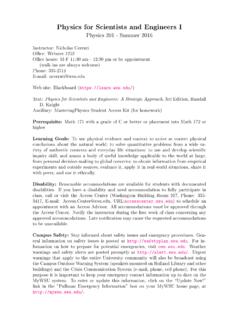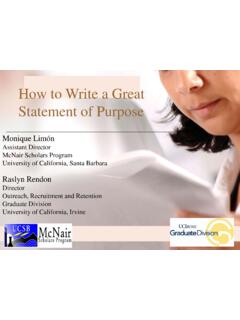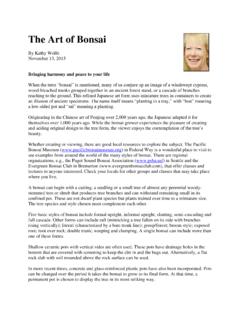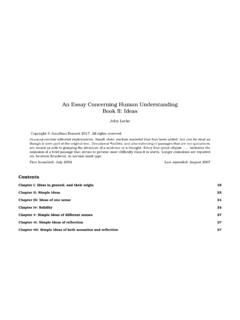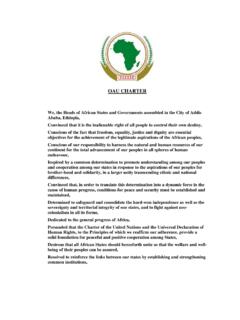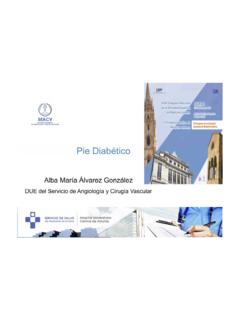Transcription of The Code Noir (1685) - Washington State University
1 The " code Noir" (1685) Source: Le code Noir ou recueil des reglements rendus jusqu'a present (Paris: Prault, 1767) [1980 reprd. by the Societ , d'Histoire de la Guadeloupe].Translated by John Garrigus The Black code Edict of the King Concerning the enforcement of order in the French American islands from the month of March 1685 Registered at the Sovereign Council of Saint-Domingue, May 6, 1687 Louis, by the grace of God, King of France and Navarre, to all present and to come, greetings. Since we owe equally our attention to all the peoples that Divine Providence has put under our obedience, We have had examined in our presence the memoranda that have been sent to us by our officers in our american islands, by whom having been informed that they need our authority and our justice to maintain the discipline of the Catholic, Apostolic, and Roman church there and to regulate the status and condition of the slaves in our said islands, and desiring to provide for this and to have them know that although they live in regions infinitely removed from our normal residence.
2 We are always present to them, not only by the range of our power, but also by the promptness of our attempts to assist them in their needs. For these reasons, by the advice of our Council, and by our certain knowledge, full power, and royal authority, We have said, ruled, and ordered, we say, rule, and order, wish, and are pleased by that which follows. First Article We wish and intend that the edict by the late King of glorious memory our very honored lord and father of 23 April 1615 be enforced in our islands, by this we charge all our officers to evict from our Islands all the Jews who have established their residence there, to whom, as to the declared enemies of the Christian name, we order to have left within three months from the day of the publication of these present [edicts], or face confiscation of body and property.
3 II. All the slaves who will be in our Islands will be baptized and instructed in the Catholic, Apostolic, and Roman religion. We charge the planters who will buy newly arrived negres to inform the Governor and Intendant of the said islands within a week at the latest or face a descretionary fine, these [officials] will give the necessary orders to have them instructed and baptized within an appropriate time. III. We forbid any public exercise of any religion other than the Catholic, Apostolic, and Roman; we wish that the offenders be punished as rebels and disobedient to our orders. We prohibit all congregations for this end, which we declare "conventicules," illicit and seditious, subject to the same penalty which will be levied even against masters who allow or tolerate them among their slaves.
4 IV. No overseers will be given charge of negres who do not profess the Catholic, Apostolic, and Roman religion, on pain of confiscation of the said negres from the masters who had given this charge to them and of discretionary punishment of the overseers who accepted the said charge. V. We forbid our subjects of the so-called reformed religion to disturb or prevent our other subjects, even their slaves, from the free exercise of the Catholic, Apostolic, and Roman religion, on pain of exemplary punishment. VI. We charge all our subjects, whatever their status and condition, to observe Sundays and holidays that are kept by our subjects of the Catholic, Apostolic, and Roman religion.
5 We forbid them to work or to make their slaves work on these days from the hour of midnight until the other midnight, either in agriculture, the manufacture of sugar or all other works, on pain of fine and discretionary punishment of the masters and confiscation of the sugar, and of the said slaves who will be caught by our officers in their work. VII. Equally we forbid the holding of negre markets and all other markets the said days on similar pains, including confiscation of the merchandise that will be found then at the market and descretionary fine against the merchants. VIII. We declare our subjects who are not of the Catholic, Apostolic, and Roman religion incapable in the future of contracting a valid marriage.
6 We declare bastards the children born of such unions which we desire to be held and considered, we hold and we consider to be truly concubinage. IX. The free men who will have one or several children from their concubinage with their slaves, together with the masters who permitted this, will each be condemned to a fine of two thousand pounds of sugar; and if they are the masters of the slave by whom they have had the said children, we wish that beyond the fine, they be deprived of the slave and the children, and that she and they be confiscated for the profit of the [royal] hospital, without ever being manumitted.
7 Nevertheless we do not intend for the present article to be enforced if the man who was not married to an other person during his concubinage with his slave would marry in the church the said slave who by this means will be manumitted and the children rendered free and legitimate. X. The said solemnities prescribed by the Ordonnance of Blois, Articles XL, XLI, XLII, and by the declaration of November 1629 for marriages will be observed both for free persons and for slaves, nevertheless without the consent of the father and the mother of the slave being necessary, but that of the master alone.
8 XI. We forbid priests to officiate at the marriages of slaves unless they can show the consent of their masters. We also forbid masters to use any means to constrain their slaves to marry [them?] against their will. XII. The children who will be born of marriage between slaves will be slaves and will belong to the master of the women slaves, and not to those of their husband, if the husband and the wife have different masters. XIII. We wish that if a slave husband has married a free woman, the children, both male and girls, will follow the condition of their mother and be free like her, in spite of the servitude of their father; and that if the father is free and the mother enslaved, the children will be slaves the same.
9 XIV. Masters are held to put into Holy Ground in cemeteries so designated [as will] their baptized slaves; and those who die without having received baptism will be buried at night in some field near the place where they died. XV. We forbid slaves to carry any weapon, or large sticks, on pain of whipping and of confiscation of the weapon to the profit of those who seize them; with the sole exception of those who are sent hunting by their master and who carry their ticket or known mark. XVI. In the same way we forbid slaves belonging to different masters to gather in the day or night whether claiming for wedding or otherwise, whether on their master's property or elsewhere, and still less in the main roads or faraway places, on pain of corporal punishment, which will not be less than the whip and the fleur de lys [branding with the symbol of the kings of France.]
10 This was a punishment for deserters and habitual criminals in France] and which in cases of frequent violations and other aggravating circumstances can be punished with death: this we leave to the decision of judges. We charge all our subjects to approach the offenders, to arrest them and take them to prison, even if they are not officers and there is not yet any decree against them. XVII. Masters who are convicted of having permitted or tolerated such assemblies composed of slaves other than those belonging to them will be condemned in their own and private name to pay for all the damage that will have been done to their neighbors by these said assemblies and a fine of 10 ecus for the first time and double for repeat offenses.

